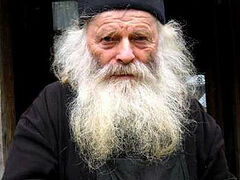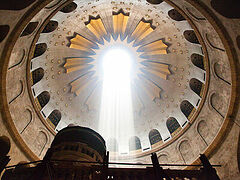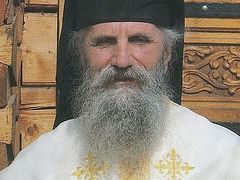The height of summer is the holiday season--it's the time for school and university vacations. This means long-awaited meetings with our friends and relatives, incomplete (in Russia) without festive parties. And for Orthodox Christians the Apostles’ Fast begins this year on June 20...
 Tea Party. Artist: Semyon Kozhin
Tea Party. Artist: Semyon Kozhin
On the road to freedom
"But why?" This news will be met with this question not even by parishioners (every consciously fasting person has already found an answer), but by the relatives and classmates who were going to share parties with us. And we will only smile in response--the Church as not only a loving, but also a very wise mother, knows our fickleness and laziness. And it knows our weakness as well. Thus, there is a time for work and a time for rest.
“The podvig of fasting helps us keep spiritually fit, as it were. Imagine an athlete who only takes part in competitions, but forgets about constant training. I doubt that he will win very much. For spiritual victories, freedom from unnecessary information and from attachment to earthly things is very important. To find it is a goal of any fasting,” says Priest Dimitry Popeko, rector of the Holy Dormition Church in the city of Engels (formerly known as Pokrovsk) in the Saratov Region.
And there is also a time for preparation for great work and a time for special petitions addressed to the Lord.
“The tradition of keeping the Apostles’ Fast originated in ancient times. First there was Pentecost with the Descent of the Holy Spirit upon the Apostles--a special joy. And what did they do next? After praying they set off on their journey of preaching around the world. It is not without reason that in the early Church this period was also called the Pentecost Fast. In addition, the podvig of fasting can change the destiny of a whole nation and avert a tragedy from it. Let us recall that after the preaching of the Prophet Jonah the Ninevites decided to keep a strict fast for three days. And the Lord had mercy on them, cancelling His punishment,” Fr. Dimitry explains.
By the power of fiery faith
“With your luminous radiance like that of the stars, initiated into the Heavenly mysteries you have enlightened the ends of the earth with the teachings of holy preaching, O lords and apostles,” we will sing on July 12, the feast of Sts. Peter and Paul, the Leaders of the Apostles. True, “the ends of the earth” are not the entire globe. But the geography of the apostles’ travels, in the absence of planes and high-speed trains, is impressive. And everywhere there were hearts open to their preaching, and everywhere communities were set up that continued to live and develop after the apostles had gone further.
What is the secret of the success of their mission?
“Imagine a volcanic eruption and burning lava that turns everything into a homogeneous burning mass. And then at some point it freezes. After Pentecost the power of the grace of God, the action of the Holy Spirit on the apostles and people who heard their preaching were like lava. It was a period of the evident action of the grace of the Holy Spirit on people’s hearts,” Fr. Dimitry answers.
Let us recall who the apostles were. They mostly belonged to the lowest class and therefore could not rely on the authority of noble birth. They were not learned scribes to captivate people with the power of eloquence and the logic of persuasion. Nor were they warriors to spread Christ’s teaching by the power of the sword. And, moreover, there were very few of them.
They only had fiery faith and the desire to share the Tidings of the Risen Christ with all people--the power that transformed the entire world. Barely three centuries had passed, and paganism collapsed--with all its political and military power, ancient philosophy and culture--unable to resist the preaching of the Galilean fishermen and lone missionaries. The great Roman Empire became a Christian state. And it turned out that there is nothing in the world stronger than God's Truth.
Why do we observe the Apostles’ Fast? Maybe in order to become partakers of this Truth and to ensure that the words of our preaching about Christ, addressed to our relatives, friends, neighbors and friends, also gains weight and strength.
Our mission
How can a modern Christian prepare for the feast of the holy Apostles Peter and Paul? First of all, by fasting, prayer and reading the Holy Scriptures. By opening the Epistles of the apostles more often and marveling at the bright conciseness, clarity and absolute relevance of their verses, which are almost 2,000 years old. They contain the true wisdom to live and the power of faith of those who were able to kindle the hearts of many, walking the length and breadth of countries and even continents.
We should try and understand what Christ’s disciples wanted to tell us, what they tried to protect us from and what they called us for. This is the relevance of the Holy Scriptures, which guide us on the path of a renewed life So holiness can become its fruit, and its end--the beginning of eternal life.
We fast for God and for ourselves, and sometimes we don’t even know that someone is watching us, thinking: “This person is fasting.” Of course, they look in different ways--some with the intent to find a breach, others with sympathy. But it is not our business to talk about this: our business is to sow, remembering the apostles.
Roads of the Roman Empire do not lie before us, calling for a journey. But let us remember St. John of Kronstadt, who dreamed of enlightening pagans. But the Lord granted him a missionary field much closer--on the outskirts of the Orthodox Empire’s capital.
“To instruct people, first you need to kindle them with your sincerity, sharing what your heart lives by. Our business is to sow, and not only on good, but also on rocky soil. And the grains of faith will take root, albeit perhaps many years later,” Bishop Pachomy of Pokrovsk and Novouzensk says.
Those around us wait for our preaching--verbal, and more often silent, by good deeds and benevolence. Sometimes they don't even know what they wait for this. Priest Vyacheslav Moskalev1 once told me the following story:
“A parishioner of our Transfiguration Church once said to me:
‘Batyushka, it was you who brought me to the church!’
‘Really? How did I do it?’ I was surprised.
‘My kitchen windows overlook the road along which you walk to church. While drinking tea, I saw you walk to the church for the first time, then for the second…, the one hundred and second time... And my conscience started tormenting me: people go to pray to God, but I am always having tea with sandwiches. So once I stood up, put my sandwich aside, and followed you to the service. And now I go this way each time.’”



